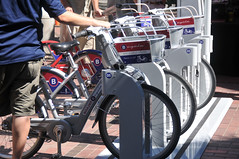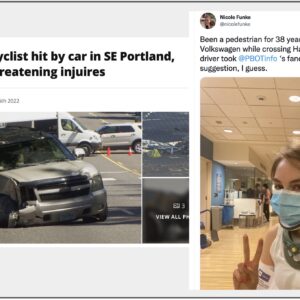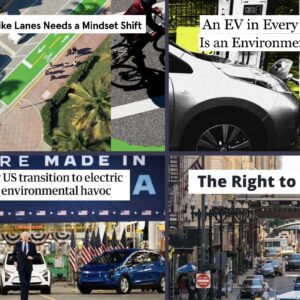It’s been a big month for sharing and two new projects in the works are likely to have a major impact on how Portlanders get around.
Last week, a key Metro committee approved $2 million in federal funding that will help start up the Portland Bike Sharing project. Once fully rolled out, Portland’s bike-sharing system will likely have about 750 bikes with 74 rental kiosks — or about one every five blocks on average. The bikes will be ubiquitous in the downtown core, offering people the option of free short trips aboard a durable and easy-to-ride vehicle.
“By making it easy for me to save money by not owning a car, I’m thinking about the cost of every mile, rather than an all-you-can-eat buffet.”
— Michael Andersen, Portland Afoot
And yesterday, news broke that peer-to-peer car-sharing company Getaround, plans to launch in Portland in the coming weeks. As expected, Getaround is taking advantage of a new Oregon law passed over the summer (not to mention a $1.7 million federal grant). That law, HB 3149, established legal standards and smoothed out insurance issues for personal car-sharing and thus paved the way for Getaround to set up shop.
In case you’re wondering, personal car-sharing is like Zipcar on steroids. It’s based on a simple principle: That people who own cars would rather rent them out for a few bucks than have them sit in their driveway — which cars do over 90% of the time according to experts. Beyond making neighborhood car rentals much easier and more widely available, it’s also very likely that the rise of personal car-sharing will result in fewer vehicle miles traveled per capita in general.
Oregon State Senator Jackie Dingfelder (who sponsored HB 3149) said over the summer that, “Car sharing families drive demonstrably less than car-owning families; and less driving means less congestion and less pollution.”
If bike-sharing and car-sharing succeed to the extent their proponents envision, while our transit network blossoms with new light rail and streetcar options, the incentive to own a car in Portland will be significantly lower than it is today. And, given all the people I know who already live carfree, that’s really saying something.
Michael Andersen, publisher of Portland Afoot, a “newsmagazine on buses, bikes and low-car life,” says anything that discourages car ownership is likely to change the mobility paradigm. “By making it easy for me to save money by not owning a car, I’m thinking about the cost of every mile, rather than an all-you-can-eat buffet.”
With an estimated 50,000 Portland households already in the “low-car” category according to Andersen (based on having fewer registered cars than residents), and with many people scrutinizing unnecessary expenditures, there’s likely a large pool of Portlanders who’d consider not buying a car unless they have to.
So, what does the future hold for urban mobility in Portland? Ask Todd Fahrner, co-owner of Clever Cycles and a noted expert in carfree living. Back in March he called car sharing, “the barely hidden bikey agenda”. In a very entertaining blog post he said the implementation of widespread personal carsharing will have a major impact on our city:
“Portland will feel like Sunday Parkways 24-7-365, except with most everybody actually going someplace, and without the abnormal police presence making it feel like an illegal dream.”
At this point it’s all still a dream. But with Getaround’s big move and bike sharing moving forward rapidly, it’s a dream that looks more like reality than it ever has before.







We need to have the same program for bikes too.
There is a peer-to-peer bike sharing program being developed call Spinlister:
http://www.fastcoexist.com/1678935/spinlister-peer-to-peer-bike-sharing-gets-rolling
I can’t wait! What a good idea, and certainly something we can benefit from as a city.
I’ve been a member of Getaround for a while now. I have not yet had the opportunity to use one, but I love the concept and see it being much more useful than Flexcar or Zipcar ever were.
My main concern is for the lack of infrastructure in the downtown area for cycling. It lacks big time. Especially when you consider cyclists who may be out of town, unfamiliar with the Portland Metro terrain. Safety first aught to have been a priority prior to setting forth this bike share program.
When the amount of injured cyclists exponentially rises following the start of bike share portland (which I guarantee will happen), unfortunately then and only then will the city be moved to build things such as a road diets or separated bike lanes downtown. In addition the new policy of outlawing all sidewalk riding downtown, even at pedestrian speed is ludicrous.
Ted?!? What the heck are you talking about? There is NO new policy outlawing sidewalk riding downtown! It’s been that way for years.
and “lack of infrastructure in the downtown area for cycling.” ????
Portland has way more infrastructure in the downtown area for cycling than a lot of American cities. And BikeSharing seems to be doing fine there.
@ Ted, not sure why you think injuries will rise with bike share. To my knowledge this has not happened in any of the other cities that have implemented a program (many of which have less infrastructure than Portland).
“The middle of the right lane”, otherwise known as already-existing bike infrastructure that is all over downtown, already!
Reminds of this recent piece I saw in the Atlantic on the rise of the sharing economy. It really is a return to local self-reliance and community connection:
http://www.theatlantic.com/business/archive/2011/12/occupy-big-business-the-sharing-economys-quiet-revolution/249582/
There was also a piece in Fast Company a while back on the same issue:
http://www.fastcompany.com/magazine/155/the-sharing-economy.html
i laughed out loud at “noted expert in carfree living.” i suppose fish are “noted experts in underwater breathing.” it’s a natural condition, mang!
Very interested in Getaround. I could see using someone else’s car, but would be pretty reluctant to let someone else use my car…I wonder if supply will match demand.
I think the general car-sharing user population is respectful of other people’s property, relatively, especially at this early stage. And people are more respectful of people in their “community”. A car-sharing community, in this case. It seems as if people drive Zipcars more respectfully than they do rental cars, in part because they are a part of the Zipcar “community”. Peer-to-peer car sharing should be an even tighter community.
“the rise of personal car-sharing will result in fewer vehicle miles traveled per capita in general.”
I’d like to see some evidence. Is the logic assumed to be that people will sell their cars and share with others? I think this should be spelled out and if there are statistics I’d like to see them.
“With an estimated 50,000 Portland households already in the “low-car” category”
Well 18% of Multnomah Co. households didn’t own a car as documented in the 2000 Census. That comes/came to 26,347 households or about that number. I’d be curious where Mr. Anderson got that number of his.
Where I envision growth in car non-ownership, is not so much in current owners giving up their cars (though there will be those–I am one)…but with new drivers weighing their options before they buy their first car, meaning weighing ALL the newly available options for mobility, including car use, against all the broader options for how they spend their money…
“would I rather add $800+ per month to buy and maintain my own solo car? OR SHIFT a significant portion of that money to housing, savings, school, hobbies, travel… or things that I can’t currently afford, like health care coverage?”
craig,
that sounds plausible. Thanks.
Mostly I’m interested in knowing whether the statements in the article reflect someone’s hopes, their speculation about what folks might do, or evidence that VMT actually decreases when a program like this is introduced.
I walk and take the Max to work. I drive my ’82 diesel Suburban (no DEQ!) maybe 35 miles/week. Paid 1K for it, dumped another 2K in repairs into it. But I sure as heck would not give it to some punk chick to mess with it, filler’up with gasoline and leave the lights on and a new gash on it, since it’s such a big monster and she can’t drive and text at the same time LOL! Sharing is good, as long as you don’t share your own stuff!
No.
1. Please do not call women “chicks.”
2. Men insure at higher rates than women as they are more likely to have fatal or high-cost collisions, so maybe you should be worried about men instead?
3. Then don’t share your stuff. Was the purpose of this comment to show how smart you are and how cheap owning a car can be?
Good question, 9watts! The other half of “low-car” households (it’s about half and half) aren’t car-free, but have fewer autos in the house than they do workers.
For what it’s worth, this means that retired couples with one car and households with multiple unemployed people who share a car haven’t been counted, so 50k is a conservative estimate.
To your first question, I think it’s not so much that people will sell their cars as that they’ll skip the next car purchase, or that young people will decide not to build their households around a bunch of cars in the first place.
And to your second question (does carsharing reduce driving?): there’s a limited but persuasive body of evidence that it does. The reason is that once we’re paying for cars by the hour, we don’t use cars for silly half-mile trips any more.
Oh, and also: part of this grant will pay our local transpo academics at OTREC to add to the currently limited body of evidence with a rigorous look at Getaround’s results.
What’s with the old image of Dominic and Andrea of Bikestation in Long Beach?
Oops, my interest just went to zero. I hit the Getaround site to sign up and found that “A Facebook account is required to use Getaround.”
I don’t have one, and won’t get one just for this. Why isn’t a CC number adequate?
I asked them this question some time ago and the reply was, “We do hope to provide an alternative log in method in the future.”
It’s so they don’t have to construct their own social network to provide feedback and traceability. Facebook isn’t bad, as long as you are proactive about your security settings.
Unfortunately, I think Todd Fahrner is wrong. Fewer cars owned doesn’t necessarily mean fewer total miles driven. The remaining cars just get driven more, so there are still as many cars on the road. (This is assuming that the simple fact of owning a car doesn’t lead people to drive more than they would if they had to use a car sharing service, which may not be a safe assumption.)
My point is that x% fewer cars owned does not equate to x% total vehicle miles driven or x% fewer cars on the road at any given time. I wish that it did, and car sharing is a good piece of the puzzle.
Facebook account required? No thanks.
It does. As it is explained above, owning a car is like going to an all-you-can-eat buffet. If you don’t have sufficient alternatives to live car free as an individual, or to share one car between two adults, you end up buying a car. Now you are invested, you are paying hundreds of dollars every month whether you use the thing or not, so you end up driving more. If you don’t have that car sitting around sucking money, you are more likely to ride your bike or take transit, and you start assigning an hourly cost to car use, as people should.
dwaine, not entirely true.
let’s say you have one zip car that has the same number of miles driven as 3 other cars. Those 3 other cars may all be on the road at the same time (like rush hour). It’s not just how many cars are on the road, it’s when. There is little marginal difference if these 3 cars are on the road late at night when there is plenty of capacity. Quite different if they are all on the road at high demand times where their impact will affect the throughput of the system to a greater extent.
A good metaphor for this is electricity demand. High consumption companies often try to use it during off-peak times.
I did this type of carsharing in British Columbia in the 1990s. With the insurance laws were there at the time (I don’t remember the specifics), there was little or no risk to me to let another party drive my car.
I had my car Friday – Monday, a Buddhist nun & her followers had it Monday – Thursday.
For two years it cost me almost nothing to own and operate my car — their monthly payment covered insurance, registration and basic maintenance. & it was a beautiful 2 km walk from my house to theirs, so it was motivation to get out for some light exercise and fresh air on Thursday or Friday night when I picked it up.
I’m glad its now legal to do this in the US. Thanks, Sen Dingfelder and other supporters for making this happen.
Ted Buehler
ps. Does anyone around Fremont and Williams need a car to share? Drop me a line.
In response to those who deny laws prohibiting riding a bike on side-walks downtown Portland:
“For the record, the city of Portland officially prohibits sidewalk bicycling or skateboarding in the area of downtown bordered by Southwest Jefferson Street, Naito Parkway, Northwest Hoyt Street and 13th Avenue.”
Wendy Culverware
Portland Business Journal
Dec 7, 2011
Ted- I think you missed the point. I didn’t say there are no “laws prohibiting riding a bike on side-walks downtown Portland”
The point was that these laws ARE. NOT NEW. They’ve been in place for years, if not decades.
i once had a hard time giving up my car.
until… one day i walked into a bike shop on hawthorne, met my wife, had 3 kids, and now ride around in merino wool bike pantaloons while carrying my entire family in my bakfiets!
@spare-wheel, Do you use NE Davis for your daily family commute?
that was snark.
Hey all-
Lots of good questions about Getaround (my employer). Here’s our FAQ page, for anyone interested:
http://support.getaround.com/
car-sharing people are no more conscientious than others. users frequently left trash, fast food remnants, horrible body odor, cigarette smoke, very personal articles of clothing, pillows and bedding, etc. in the vehicles. users also tended to use the vehicles when sick, so passing along germs was common. i don’t miss car-sharing AT ALL, and don’t recommend it to anyone. i recommend driving your car less, riding your bike, walking, and taking public transportation when possible and effective. people are generally lazy, which is more often what leads to unnecessary driving.
Really, Julie? I’m a very longtime carsharing member member (going back to about ’98, when it was CarSharing Portland, then FlexCar, now ZipCar) and although I only use it a few times a year, I’ve only once been in a vehicle that was less than clean and Zipcar comp’ed me for it.
Never thought about the germ concern, but then again as a parent so I’m already exposed to (and thus pre-immunized against!) most of what’s out there!